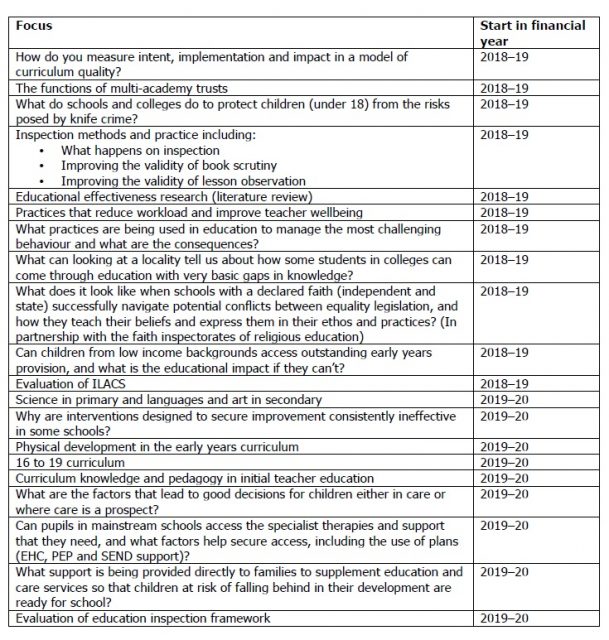Ofsted will soon call on FE providers to help it undertake a “huge” amount of FE-related research projects, according to its director of corporate strategy.
The education watchdog has set aside around £2.4 million, or 4 per cent of its inspector resource, to spend on 20 studies over the next two years.
It is part of Amanda Spielman’s drive for a more evidence-based inspection regime after Ofsted went years without basing judgements on research, under the leadership of former chief inspector Sir Michael Wilshaw.
We would be doing a disservice if we weren’t making sure that our inspections were based on latest evidence
But of the 20 upcoming projects (see table below), not a single one has been dedicated solely to FE and skills.
Despite this, Ofsted director Luke Tryl told FE week that a “huge number” of them will be “related to FE”.
“A lot of what we do is cross remit,” he said.
“The educational effectiveness literature review is specifically looking at the evidence related to FE, and the project we’ve just carried out – ‘inspection methods and practice’ – tested lesson observations and work scrutiny in FE providers.
“Both of those, which are our two major evaluation projects, are very much applying to FE as well as schools.”
Mr Tryl continued to list more of the research projects which will be FE-related: “The project looking at how to measure intent, implementation and impact in a model of curriculum quality is with FE providers.
“We are doing a specific project on the 16 to 19 curriculum which is going to be an FE specific study focusing on the vocational curriculum and the curriculum as applied to apprenticeships.
“The workload and wellbeing project includes FE providers who we surveyed and followed up with visits, and the knowledge gaps for students is specifically a college project.”

Ofsted’s research into knife-crime, special educational needs, and initial teacher training will also be carried out using FE providers.
“We think we’re doing quite a lot in FE but because it doesn’t specifically say it in the title it looks like it’s only schools,” Mr Tryl added.
All of this work is being carried out with the ambition of ensuring the 2019 inspection framework is the “most evidenced based in Ofsted’s history”.
“When it comes to our own inspection practice gone are the days where an inspector walks into an institution and based on their experience they can come to a judgement,” Mr Tryl said.
“Actually their judgement should all be grounded in the evidence. We would be doing a disservice if we weren’t making sure that our inspections were based on latest evidence and they are valid and reliable.”
He explained that spending £1.2 million each year until 2020 on research “represents an increase” compared to recent years – although Ofsted could not provide actual figures for past years as “these aren’t comparable and aren’t readily available”.
“It [researching] is going back to something we used to do a lot more of,” Mr Tryl said.
“Pre-Sir Michael there was a much bigger focus on research and it is something Amanda has brought back.”
He added that FE providers can expects calls asking them to take part in the projects soon.
Ofsted’s 20 upcoming ‘major research and evaluation projects’










Even a cursory review of the OFSTED inspection Framework illustrates the uncomfortable fit it has in several areas concerning adult work-based training provision. It is therefore surprising that it appears no research activity is included to look directly at this issue. However, given the focus for OFSTED maybe it isn’t!
All inspection is (or should be) based on evidence, so please don’t try and make it sound as if there is some new discovery. This set of projects again shows how remote Ofsted is from the general world of FE. Has Mr Tryl any background in real life teaching and training or is he a professional academic? What FE wants research in are vitally important areas for the sector such as best practice in improving the English and maths of those let down by schools deemed outstanding who gain a second chance in FE; delivering education and training with an ever decreasing resource and amount of time with learners [30 hours when I started in FE and now half that]; how to deliver a new curriculum with work experience every week when employers cannot be coaxed into providing it; delivering the government target of 3 million apprenticeships when there are again not the employers out there to offer the jobs with training in order to do so. All this with an Ofsted workforce that seems to be becoming further and further removed from having the right experience to inspect learning and skills. If you want to know the best way to inspect ask the people being inspected. It starts with having the right experience and expertise as a firm foundation.
A few days ago Ofsted were complaining that they did not have enough cash to
carry out campus inspections, is it any wonder! A decade ago, the Common
Inspection Framework was published and used for a full cycle of inspections.
This meant providers could see how they were performing against the rest of
the sector. Now Ofsted publish the latest CIF and then, a few weeks later, seek
to change it! If the former Education Secretary’s advisor wants to find out about education, training and skills and how to do it well, can I suggest a
standard rail ticket to Exeter, Blackpool, Gateshead…..etc. This might be a little
cheaper and better still, more relevant!